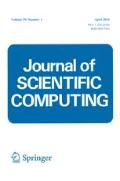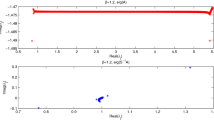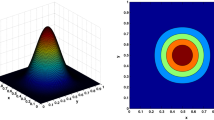Abstract
In this work, we study numerically two-dimensional nonlinear spatial fractional complex Ginzburg–Landau equations. A centered finite difference method is exploited to discretize the spatial variables and leads to a system of the ordinary differential equation, in which the resulting coefficient matrix is complex symmetric and possesses the block Toeplitz structure. An exponential Runge–Kutta method is employed to solve such a system of the ordinary differential equation. Theoretically, the proposed method is second-order accuracy in space and fourth-order accuracy in time, respectively. In the practical implementation, the product of a block Toeplitz matrix exponential and a vector is calculated by the shift-invert Lanczos method. Meanwhile, the sectorial operator (the coefficient matrix) guarantees the fast approximation by the shift-invert Lanczos method. Numerical experiments are carried out to testify the theoretical results and demonstrate that the proposed method enjoys the excellent computational advantage.




Similar content being viewed by others
References
Aranson, I.S., Kramer, L.: The world of the complex Ginzburg–Landau equation. Rev. Mod. Phys. 74, 99–143 (2002)
Arshed, S.: Soliton solutions of fractional complex Ginzburg–Landau equation with Kerr law and non-Kerr law media. Optik 160, 322–332 (2018)
Çelik, C., Duman, M.: Crank–Nicolson method for the fractional diffusion equation with the Riesz fractional derivative. J. Comput. Phys. 231, 1743–1750 (2012)
Chan, R., Jin, X.: An Introduction to Iterative Toeplitz Solvers. SIAM, Philadelphia (2007)
Chan, R., Ng, M.: Conjugate gradient methods for Toeplitz systems. SIAM Rev. 38, 427–482 (1996)
Cox, S.M., Matthews, P.C.: Exponential time differencing for stiff systems. J. Comput. Phys. 176, 430–455 (2002)
Du, Q., Gunzburger, M.D., Peterson, J.S.: Analysis and approximation of the Ginzburg–Landau model of superconductivity. SIAM Rev. 34, 54–81 (1992)
Ginzburg, V.L., Landau, L.D.: On the theory of superconductivity. Zh. Eksp. Teor. Fiz. 20, 1064–1082 (1950)
Gohberg, I., Semencul, A.: On the inversion of finite Toeplitz matrices and their continuous analogs. Matem. Issled. 2, 201–233 (1972)
Gorenflo, R., Mainardi, F.: Random walk models for space-fractional diffusion processes. Fract. Calc. Appl. Anal. 1, 167–191 (1998)
Guo, B.L., Huo, Z.H.: Well-posedness for the nonlinear fractional Schrödinger equation and inviscid limit behavior of solution for the fractional Ginzburg–Landau equation. Fract. Calc. Appl. Anal. 16, 226–242 (2013)
He, D., Pan, K.: An unconditionally stable linearized difference scheme for the fractional Ginzburg–Landau equation. Numer. Algorithms 79, 899–925 (2018)
Heinig, G., Rost, L.: Algebraic Methods for Toeplitz-like Matrices and Operators. Birkhäuser, Basel (1984)
Higham, N.J.: Functions of Matrices: Theory and Computation. SIAM, Philadelphia (2008)
Hochbruck, M., Ostermann, A.: Exponential Runge–Kutta methods for parabolic problems. Appl. Numer. Math. 53, 323–339 (2005)
Hochbruck, M., Ostermann, A.: Exponential integrators. Acta Numer. 19, 209–286 (2010)
Horn, R., Johnson, C.: Topics in Matrix Analysis. Cambridge University Press, Cambridge (1991)
Jin, X.: Developments and Applications of Block Toeplitz Iterative Solvers. Kluwer, Dordrecht (2002)
Kassam, A.K., Trefethen, L.N.: Fourth-order time-stepping for stiff PDEs. SIAM J. Sci. Comput. 26, 1214–1233 (2005)
Krogstad, S.: Generalized integrating factor methods for stiff PDEs. J. Comput. Phys. 203, 72–88 (2005)
Laskin, N.: Fractional quantum mechanics and Lévy path integrals. Phys. Lett. A 268, 298–305 (2000)
Laskin, N.: Fractional quantum mechanics. Phys. Rev. E 62, 3135–3145 (2000)
Lee, S., Liu, X., Sun, H.: Fast exponential time integration scheme for option pricing with jumps. Numer. Linear Algebra Appl. 19, 87–101 (2012)
Lee, S., Pang, H., Sun, H.: Shift-invert Arnoldi approximation to the Toeplitz matrix exponential. SIAM J. Sci. Comput. 32, 774–792 (2010)
Li, M., Huang, C.M.: An efficient difference scheme for the coupled nonlinear fractional Ginzburg–Landau equations with the fractional Laplacian. Numer. Methods Part. Differ. Equ. 35, 394–421 (2019)
Li, M., Huang, C.M., Wang, N.: Galerkin element method for the nonlinear fractional Ginzburg–Landau equation. Appl. Numer. Math. 118, 131–149 (2017)
Lu, H., Bates, P.W., Lü, S.J., Zhang, M.J.: Dynamics of the 3-D fractional complex Ginzburg–Landau equation. J. Differ. Equ. 259, 5276–5301 (2015)
Lu, H., Lü, S.J.: Asymptotic dynamics of 2D fractional complex Ginzburg–Landau equation. Int. J. Bifurc. Chaos 23, 1350202 (2013)
Lu, H., Lü, S.J.: Random attractor for fractional Ginzburg–Landau equation with multiplicative noise. Taiwan. J. Math. 18, 435–450 (2014)
Lu, H., Lü, S.J., Zhang, M.J.: Fourier spectral approximations to the dynamics of 3D fractional complex Ginzburg–Landau equation. Discrete Contion. Dyn. Syst. 37, 2539–2564 (2017)
Millot, V., Sire, Y.: On a fractional Ginzburg–Landau equation and \(1/2\)-Harmonic maps into spheres. Arch. Ration. Mech. Anal. 215, 125–210 (2015)
Milovanov, A., Rasmussen, J.: Fractional generalization of the Ginzburg–Landau equation: an unconventional approach to critical phenomena in complex media. Phys. Lett. A 337, 75–80 (2005)
Mohebbi, A.: Fast and high-order numerical algorithms for the solution of multidimensional nonlinear fractional Ginzburg–Landau equation. Eur. Phys. J. Plus 133, 67 (2018)
Moret, I., Novati, P.: RD-rational approximations of the matrix exponential. BIT Numer. Math. 44, 595–615 (2004)
Mvogo, A., Tambue, A., Ben-Bolie, G., Kofane, T.: Localized numerical impulse solutions in diffuse neural networks modeled by the complex fractional Ginzburg–Landau equation. Commun. Nonlinear Sci. 39, 396–410 (2016)
Owolabi, K.M., Patidar, K.C.: Higher-order time-stepping methods for time-dependent reaction–diffusion equations arising in biology. Appl. Math. Comput. 240, 30–50 (2014)
Pang, H., Sun, H.: Fast exponential time integration for pricing options in stochastic volatility jump diffusion models. East Asian J. Appl. Math. 4, 53–68 (2014)
Pang, H., Sun, H.: Shift-invert Lanczos method for the symmetric positive semidefinite Toeplitz matrix exponential. Numer. Linear Algebra Appl. 18, 603–614 (2011)
Pu, X.K., Guo, B.L.: Well-posedness and dynamics for the fractional Ginzburg–Landau equation. Appl. Anal. 92, 31–33 (2013)
Saad, Y.: Iterative Methods for Sparse Linear Systems. SIAM, Philadelphia (2003)
Shu, J., Li, P., Zhang, J., Liao, O.: Random attractors for the stochastic coupled fractional Ginzburg–Landau equation with additive noise. J. Math. Phys. 56, 102702 (2015)
Tarasov, V., Zaslavsky, G.: Fractional Ginzburg–Landau equation for fractal media. Physica A 354, 249–261 (2005)
Tarasov, V., Zaslavsky, G.: Fractional dynamics of coupled oscillators with long-range interaction. Chaos 16, 023110 (2006)
Van den Eshof, J., Hochbruck, M.: Preconditioning Lanczos approximations to the matrix exponential. SIAM J. Sci. Comput. 27, 1438–1457 (2006)
Wang, N., Huang, C.M.: An efficient split-step quasi-compact finite difference method for the nonlinear fractional Ginzburg–Landau equations. Comput. Math. Appl. 75, 2223–2242 (2018)
Wang, P., Huang, C.M.: An energy conservative difference scheme for the nonlinear fractional Schrödinger equations. J. Comput. Phys. 293, 238–251 (2015)
Wang, P., Huang, C.M.: An implicit midpoint difference scheme for the fractional Ginzburg–Landau equation. J. Comput. Phys. 312, 31–49 (2016)
Wang, P., Huang, C.M.: An efficient fourth-order in space difference scheme for the nonlinear fractional Ginzburg–Landau equation. BIT Numer. Math. 58, 783–805 (2018)
Zhang, L., Sun, H., Pang, H.: Fast numerical solution for fractional diffusion equations by exponential quadrature rule. J. Comput. Phys. 299, 130–143 (2015)
Zhang, M., Zhang, G.F., Liao, L.D.: Fast iterative solvers and simulation for the space fractional Ginzburg–Landau equations. Comput. Math. Appl. 78, 1793–1800 (2019)
Zhang, Q., Ren, Y., Lin, X., Xu, Y.: Uniform convergence of compact and BDF methods for the space fractional semilinear delay reaction–diffusion equations. Appl. Math. Comput. 358, 91–110 (2019)
Zhang, Q., Pan, K., Lin, X., Ren, Y.: Linearized ADI schemes for two-dimensional space-fractional nonlinear Ginzburg–Landau equation (revised)
Zhang, Q., Zhang, L., Sun, H.: A three-level finite difference method with preconditioning technique for two-dimensional nonlinear fractional complex Ginzburg–Landau equations (submitted)
Zhao, X., Sun, Z., Hao, Z.: Fourth-order compact ADI scheme for two-dimensional nonlinear space fractional Schrödinger equation. SIAM J. Sci. Comput. 36, A2865–A2886 (2014)
Acknowledgements
The authors are very grateful to the anonymous referees for their constructive comments and valuable suggestions, which greatly improved the original manuscript of the paper.
Author information
Authors and Affiliations
Corresponding author
Additional information
Publisher's Note
Springer Nature remains neutral with regard to jurisdictional claims in published maps and institutional affiliations.
The work was supported in part by Natural Science Foundation of China (Grant Number 11501514), Natural Sciences Foundation of Zhejiang Province (Grant Number LY19A010026), the Zhejiang Province “Yucai” Project, the Fundamental Research Funds of Zhejiang Sci-Tech University (Grant Number 2019Q072), the research from Xuzhou University of Technology (Grant XKY2015302), the “Peiyu” Project from Xuzhou University of Technology (Grant Number XKY2019104), the Science and Technology Development Fund, Macau SAR (File Number 0118/2018/A3), and MYRG2018-00015-FST from University of Macau.
Rights and permissions
About this article
Cite this article
Zhang, L., Zhang, Q. & Sun, HW. Exponential Runge–Kutta Method for Two-Dimensional Nonlinear Fractional Complex Ginzburg–Landau Equations. J Sci Comput 83, 59 (2020). https://doi.org/10.1007/s10915-020-01240-x
Received:
Revised:
Accepted:
Published:
DOI: https://doi.org/10.1007/s10915-020-01240-x
Keywords
- Space fractional Ginzburg–Landau equation
- Toeplitz structure
- Exponential Runge–Kutta method
- Matrix exponential
- Shift-invert Lanczos method




